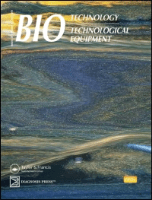
BIOTECHNOLOGY & BIOTECHNOLOGICAL EQUIPMENT
Scope & Guideline
Fostering Collaboration in Biotechnological Advancements
Introduction
Aims and Scopes
- Biotechnological Applications:
Research articles often explore practical applications of biotechnology in agriculture, medicine, and environmental science, showcasing innovations that can lead to improved methods and products. - Molecular Biology and Genetics:
A significant focus on molecular biology techniques, including gene editing, genetic mapping, and the analysis of genetic diversity, reflects the journal's commitment to advancing genetic research. - Microbial Biotechnology:
The journal frequently publishes studies on the utilization of microorganisms in various processes such as fermentation, bioremediation, and the production of bioactive compounds, highlighting the role of microbes in biotechnological applications. - Analytical Techniques and Equipment:
There is a strong emphasis on the development and validation of analytical methods and equipment used in biotechnology, including biosensors and high-throughput screening technologies. - Environmental Biotechnology:
Research articles often address environmental challenges and solutions through biotechnological approaches, including waste treatment and sustainable agricultural practices.
Trending and Emerging
- CRISPR and Gene Editing Technologies:
There is a growing trend in the publication of studies related to CRISPR and other gene editing technologies, showcasing their applications in crop improvement and disease resistance. - Biopharmaceutical Development:
A noticeable increase in research related to biopharmaceuticals, including the development of novel drugs and therapeutic strategies, particularly in the context of COVID-19, signifies the journal's alignment with global health challenges. - Microbiome Research:
Emerging studies focusing on the role of the microbiome in health, agriculture, and environmental sustainability are increasingly prevalent, reflecting a broader interest in understanding complex microbial interactions. - Sustainable Biotechnology:
Research addressing sustainability in biotechnological processes, including biofuels, bioplastics, and bioremediation, is on the rise, indicating a shift towards environmentally friendly practices. - Artificial Intelligence in Biotechnology:
The integration of artificial intelligence and machine learning into biotechnological research and equipment development is emerging as a significant theme, showcasing the intersection of technology and biotechnology.
Declining or Waning
- Traditional Agricultural Biotechnology:
There has been a noticeable decrease in research focused on traditional agricultural biotechnology methods, such as conventional breeding techniques, as newer, more advanced genetic modification technologies gain prominence. - Basic Biochemical Studies:
Papers centered on basic biochemical pathways without direct applications to biotechnology or equipment are becoming less common, as the journal leans towards more applied research. - Single-Species Microbial Studies:
Research focused solely on single-species microbial studies, without broader implications for microbial consortia or ecosystem-level approaches, is declining, indicating a shift towards more integrative studies.
Similar Journals

Journal of Genetic Engineering and Biotechnology
Transforming Ideas into Genetic RealitiesJournal of Genetic Engineering and Biotechnology, published by Elsevier Science Inc, is a prestigious open-access journal that stands at the forefront of research in the fields of biotechnology and genetics. Since its inception in 2011, the journal has provided a platform for cutting-edge studies that explore the complexities and innovations within genetic engineering and its applications in biotechnology. With a commendable Impact Factor and recognized as a Q2 journal in both biotechnology and genetics as per 2023 categorization, it ranks well within Scopus, evidencing its influence in the scientific community. Researchers and professionals accessing articles published in this journal benefit from timely contributions that bridge theoretical and practical aspects of genetic technologies. By fostering a collaborative environment, the Journal of Genetic Engineering and Biotechnology aims to promote advancements that drive science forward, making it an essential resource for students, academics, and industry practitioners alike. For those interested in making their mark in these rapidly evolving fields, this journal offers unparalleled access to high-quality, peer-reviewed research.

BIOTECHNOLOGY ADVANCES
Innovating Solutions for a Sustainable FutureBIOTECHNOLOGY ADVANCES is a premier, peer-reviewed journal published by PERGAMON-ELSEVIER SCIENCE LTD, dedicated to advancing knowledge in the rapidly evolving fields of biotechnology and bioengineering. With an ISSN of 0734-9750 and an E-ISSN of 1873-1899, this esteemed journal covers a wide spectrum of topics relevant to applied microbiology, molecular biology, and biochemical innovation. Recognized for its academic rigor, it holds a distinguished position in the top quartile (Q1) in multiple categories, including Applied Microbiology and Biotechnology, Bioengineering, and Biotechnology, further evidenced by its high rankings in Scopus, where it ranks #3/127 in Applied Microbiology and Biotechnology and #7/311 in Biotechnology. Researchers and professionals in the field value the journal not only for its comprehensive coverage of cutting-edge research but also for its commitment to disseminating critical findings and fostering collaboration. While BIOTECHNOLOGY ADVANCES currently operates under a subscription model, its potential impact on future innovations in biotechnology cannot be overstated, making it an essential resource for anyone interested in the forefront of biotechnological advancements.

WORLD JOURNAL OF MICROBIOLOGY & BIOTECHNOLOGY
Pioneering Discoveries for a Sustainable FutureWORLD JOURNAL OF MICROBIOLOGY & BIOTECHNOLOGY, published by Springer, serves as a pivotal forum for advancing the fields of microbiology and biotechnology since its inception in 1990. Located in the Netherlands, this esteemed journal has secured a prominent position in the academic landscape, recognized for its strong impact factor and prestigious Q2 category rankings across disciplines such as Applied Microbiology, Biotechnology, and Physiological Sciences. Researchers and professionals utilize this journal to disseminate innovative findings and explore emerging technologies that are transforming the scientific landscape. With a robust submission rate and high visibility among the academic community, the journal fosters interdisciplinary collaboration, encouraging discussions that bridge gaps between theory and practical applications. As it converges into 2024, the WORLD JOURNAL OF MICROBIOLOGY & BIOTECHNOLOGY continues to be a vital resource for scholars aiming to enhance our understanding of microbial processes and biotechnological advances.

MOLECULAR BIOTECHNOLOGY
Pioneering Research in Biotechnology ApplicationsMOLECULAR BIOTECHNOLOGY, published by SPRINGERNATURE, is a pivotal journal in the fields of applied microbiology, molecular biology, biochemistry, and biotechnology. Since its inception in 1994, the journal has aimed to disseminate high-quality research that explores the intersection of molecular biology and technology, fostering advancements in biotechnology applications. With an ISSN of 1073-6085 and an E-ISSN of 1559-0305, it has established itself as a significant contributor to the scientific community, currently holding a Q3 ranking across multiple categories including Applied Microbiology & Biotechnology and Biochemistry in the 2023 metrics. Although not an open access publication, the journal remains accessible through various institutional subscriptions, providing valuable insights and findings to researchers and professionals. Given its ongoing commitment to quality and relevance, MOLECULAR BIOTECHNOLOGY serves as an essential resource for those involved in cutting-edge research and innovation in molecular biotechnology and related disciplines.

Biotechnology Journal
Connecting researchers to the latest breakthroughs in biotechnology.Biotechnology Journal, published by WILEY-V C H VERLAG GMBH, stands at the forefront of biotechnological research and innovation, recognized for its significant contributions to the fields of applied microbiology, molecular medicine, and broader biotechnology. With its ISSN 1860-6768 and E-ISSN 1860-7314, this journal has achieved impressive 2023 quartile rankings, positioning itself in Q1 for both Applied Microbiology and Biotechnology and Medicine (miscellaneous), and Q2 in Molecular Medicine, showcasing its impact and relevance within the scientific community. Based in Germany, the journal aims to disseminate high-quality research that drives advancements in biotechnological applications, fostering a platform for researchers, professionals, and students to engage with cutting-edge developments. With its ongoing commitment to excellence, the Biotechnology Journal is an essential resource for those seeking to stay informed about the latest trends and innovations in biotechnology.

BIOTECHNOLOGY AND BIOPROCESS ENGINEERING
Innovating Solutions for Tomorrow's Bioprocess ChallengesBIOTECHNOLOGY AND BIOPROCESS ENGINEERING, published by the Korean Society for Biotechnology and Bioengineering, is a prominent journal in the fields of applied microbiology, biotechnology, bioengineering, and biomedical engineering. Since its inception in 1996, this journal has served as a vital platform for researchers and professionals, facilitating the dissemination of cutting-edge research and innovative applications related to bioprocesses and biotechnology systems. With an ISSN of 1226-8372, this journal is ranked within the Q3 quartile across several categories, demonstrating its relevance and impact in the academic community. Although it operates under traditional access modalities, the journal strives to provide quality and timely insights into the advancements in bioprocess technology and microbial applications, fostering a collaborative environment for knowledge exchange. Notably, it is indexed with a respectable presence on Scopus, making it a valuable resource for students and professionals seeking the latest developments in biotechnology. For more details, kindly refer to the Korean Science Technology Center, #704 Yeoksam-Dong, Gangnam-Ku, Seoul 135-703, South Korea.

REVIEWS IN ENVIRONMENTAL SCIENCE AND BIO-TECHNOLOGY
Pioneering Solutions for a Greener TomorrowREVIEWS IN ENVIRONMENTAL SCIENCE AND BIO-TECHNOLOGY is a leading academic journal published by Springer, focusing on the interdisciplinary study and advancement of environmental science and biotechnological applications. With an impressive impact factor that places it in the top quartile of its categories, this journal has consistently ranked highly (Q1) in vital fields such as Applied Microbiology and Biotechnology, Environmental Engineering, Pollution, and Waste Management and Disposal, reflecting its significant contribution to these domains. Established in 2002 and continuing to publish cutting-edge research, the journal primarily caters to researchers, professionals, and students who seek to stay abreast of the latest findings and methodologies in environmental sustainability and biotechnological innovations. While it does not currently offer open-access options, subscribers have access to a wealth of comprehensive reviews and original articles that explore the ever-evolving challenges and solutions in environmental science. Located in the Netherlands, REVIEWS IN ENVIRONMENTAL SCIENCE AND BIO-TECHNOLOGY is instrumental in bridging the gap between scientific research and practical application, promoting a collaborative approach to addressing global environmental issues.

Research Journal of Biotechnology
Exploring the frontiers of biotechnology research.Research Journal of Biotechnology is a premier publication dedicated to advancing the field of biotechnology through the dissemination of impactful research articles. Published by Research Journal Biotechnology in India, this journal operates under an Open Access model, facilitating unrestricted access to high-quality research for researchers, professionals, and students worldwide. With an ISSN of 2278-4535 and an E-ISSN of 2278-4535, the journal aims to serve as a comprehensive platform for innovative studies in Applied Microbiology and Biotechnology, Bioengineering, and Biotechnology. Despite its current Q4 quartile ranking in these categories, the journal aspires to extend its influence and visibility in the academic community, aiming for greater impact in the future. The journal features research articles that span a wide array of topics in biotechnology, fostering a collaborative and knowledge-rich environment for national and international scholars. We invite you to explore, contribute to, and engage with the expanding landscape of biotechnological research through the Research Journal of Biotechnology.

ELECTRONIC JOURNAL OF BIOTECHNOLOGY
Fostering Innovative Research for Global ImpactThe Electronic Journal of Biotechnology is a premier Open Access journal published by Pontificia Universidad Catolica de Valparaiso, Chile, dedicated to advancing the fields of applied microbiology and biotechnology. With its inception in 1998 and an unwavering commitment to sharing knowledge, the journal has garnered a respectable ranking within the Q3 quartile for both its biotechnology and applied microbiology categories as of 2023, reflecting its significance in the academic community. Researchers and professionals will find its editorial rigor complemented by a robust platform for disseminating innovative findings, fostering collaboration, and driving forward biotechnology discussions. Given its inclusive approach, having transitioned to Open Access in 2014, the journal ensures that research is accessible to a global audience, making it a valuable resource for students, academics, and industry practitioners alike. Through the publication of original research, reviews, and critical insights, the Electronic Journal of Biotechnology aims to bridge the gap between scientific discovery and practical application, ultimately contributing to advancements in health, agriculture, and environmental sustainability.

BIOTECHNOLOGY LETTERS
Advancing the Frontiers of Biotechnology ResearchBIOTECHNOLOGY LETTERS is a prestigious peer-reviewed journal that has been at the forefront of biotechnology research since its inception in 1979. Published by Springer, this esteemed journal serves as a vital platform for disseminating cutting-edge research in the fields of applied microbiology, bioengineering, and biotechnology, with a focus on innovative methodologies and technologies. With an impact factor reflecting its critical contribution to the discipline, BIOTECHNOLOGY LETTERS resides in the Q2 and Q3 tiers of various scientific categories, placing it among the notable journals in the biotechnological landscape. Although it offers traditional access options and does not feature open access, the journal embraces a global readership, encouraging submissions from researchers, professionals, and students eager to explore the dynamic advancements in biotechnology. Situated in the Netherlands, it continues to shape the future of the field through relevant, impactful research that addresses contemporary challenges and opportunities in medicine and beyond.